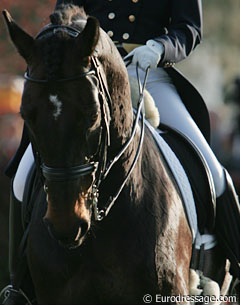|
Sport Psychology
Sport Psychology for Dressage: Recovering from Trauma
by Seana Adamson, Ph.D. - 30 March 2010
 The inherent danger in working with a fourteen hundred pound animal is an unfortunate reality in the world of equestrian sports. If you have spent a lot of time around horses you have probably either witnessed or experienced some kind of injury. Courtney King- Dye’s terrible injury has sent a shock wave around the dressage community. We can all imagine what an intense experience this must be for her close friends and family. The inherent danger in working with a fourteen hundred pound animal is an unfortunate reality in the world of equestrian sports. If you have spent a lot of time around horses you have probably either witnessed or experienced some kind of injury. Courtney King- Dye’s terrible injury has sent a shock wave around the dressage community. We can all imagine what an intense experience this must be for her close friends and family.
When there is a trauma, the stress affects not only the accident victim, but also the people around them. When someone you care about experiences a trauma, whether you witnessed the event or not, it can leave you feeling stunned, depressed and afraid. Family and friends experience a powerful combination of emotions. Shock, sadness and disbelief may compete with hope, relief and acceptance. Even after the initial shock has worn off, there can be lingering effects.
Chronic stress suppresses the immune system, leaving you more susceptible to disease. In fact the effect of chronic stress can be profound and have a multitude of physical and mental symptoms. It is common to feel sad, exhausted, distracted or depressed. Some studies have shown an increase in traffic accidents with drivers who are experiencing severe stress.
Post traumatic stress can lead to a cluster of problems that may interfere with your life. First of all, let’s look at what happens to the nervous system. The traumatic event imprints on the primitive part of your brain. Your body desperately wants you to avoid a repeat of this experience in the future, so it goes on red alert, constantly watching the environment for danger. You may notice a hyper vigilance towards anything loud, sudden or surprising. This hyper active response makes any additional trauma seem even worse. Eventually your adrenal system gets wiped out from being constantly on guard, leaving you with a sense of hollow exhaustion. I had one client who had witnessed a horrible traffic accident involving a horse. She said, “I feel like I’m moving through life going from frightened to fried. I spend my time either anxious or exhausted.”
Guilt and regret commonly show up with post traumatic stress. People may report tremendous anger towards themselves for not having better foresight. A client who broke her leg in a horse related accident said, “If only I hadn’t been in such a hurry! If I had just taken a few extra minutes this accident never would have happened.” Hind sight is always perfect vision. Guilt and regret are good only when they push us to examine our behavior and determine whether we need to make a change. Perhaps you don’t always wear your helmet, and now you will decide to wear it all the time. That is a good thing, but then it is time to let go of regret, and focus on creating a positive future with your new found wisdom.
Our brain is very trainable. Unfortunately it easily learns negative patterns, as well as positive ones. When you have been undergoing chronic stress, it is important to disrupt the negative brain pattern that can become an unconscious habit. These negative brain patterns can lead to problems with sleeping, eating, alcohol and drugs. Fortunately there are some relatively simple solutions. In each case the goal is to quiet down the rapid firing, compulsive brain patterns that get us into trouble. These solutions are simple, but they must be incorporated into your life regularly. Train your brain just as you would train your horse. You must be regular, consistent and patient. Here are your training exercises. Use any that work for you, or come up with your own strategies.
1. Turn off the computer, television and telephone. Enjoy the silence.
2. Use regular meditation, prayer, or any other contemplative practice.
3. Learn any type of breathing exercises.
4. Learn any type of relaxation exercises.
5. Get a massage.
6. Soak in a hot bath.
7. Exercise
8. Listen to music.
9. Learn to stay in the moment.
10. Be grateful every day.
Including any of these exercises into your daily life can make a big difference in your stress patterns. It is impossible to avoid stress unless you live in a fairy tale, so you may as well figure out how to deal with it in a healthy way. If you need additional help it should be available from a mental health professional in your area. A popular way of de-programming a traumatic event is the use of eye movement desensitization and reprocessing (EMDR). This technique should be done by a trained therapist. You can contact the EMDR International Association for a list of certified EMDR therapists. See their web site, www.emdria.org for more information.
Unfortunately accidents and injuries are a part of life. Though we can avoid many problems by just paying attention, nothing is perfect, and sometimes ---- happens. As we contemplate Courtney King-Dye’s injury it is hard to be unaffected. People often say that everything happens for a reason. I don’t know if I agree with that. Sometimes it seems the universe is incredibly impersonal and random. But here is to wearing a helmet, and then embracing life with passion.
If you have questions or comments please feel free to contact me at seanaadams@aol.com. I enjoy hearing from you!
Related Links
Facing Jumps
Five Ways to Breathe for Performance
How to Beat Your Toughest Competitor
Five Ways to Stay in Focus
|
